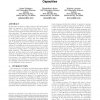Free Online Productivity Tools
i2Speak
i2Symbol
i2OCR
iTex2Img
iWeb2Print
iWeb2Shot
i2Type
iPdf2Split
iPdf2Merge
i2Bopomofo
i2Arabic
i2Style
i2Image
i2PDF
iLatex2Rtf
Sci2ools
109
click to vote
ATAL
2003
Springer
2003
Springer
Resource allocation games with changing resource capacities
In this paper we study a class of resource allocation games which are inspired by the El Farol Bar problem. We consider a system of competitive agents that have to choose between several resources characterized by their time dependent capacities. The agents using a particular resource are rewarded if their number does not exceed the resource capacity, and punished otherwise. Agents use a set of strategies to decide what resource to choose, and use a simple reinforcement learning scheme to update the accuracy of strategies. A strategy in our model is simply a lookup table that suggests to an agent what resource to choose based on the actions of its neighbors at the previous time step. In other words, the agents form a social network whose connectivity controls the average number of neighbors with whom each agent interacts. This statement of the adaptive resource allocation problem allows us to fully parameterize it by a small set of numbers. We study the behavior of the system via nume...
Related Content
| Added | 06 Jul 2010 |
| Updated | 06 Jul 2010 |
| Type | Conference |
| Year | 2003 |
| Where | ATAL |
| Authors | Aram Galstyan, Shashikiran Kolar, Kristina Lerman |
Comments (0)

